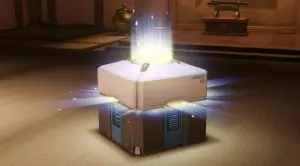 The Entertainment Software Rating Board (ESRB), the organization that rates the content of video games and assigns labels, will include a new notice, warning users about loot boxes. The new rating is introduced with the specific purpose of notifying parents of the randomized nature of in-game purchases before buying or downloading a game.
The Entertainment Software Rating Board (ESRB), the organization that rates the content of video games and assigns labels, will include a new notice, warning users about loot boxes. The new rating is introduced with the specific purpose of notifying parents of the randomized nature of in-game purchases before buying or downloading a game.
The ESRB has announced in a blog post on Monday that it would be adding the new description In-Game Purchases (Includes Random Items) to its labels. With this move, the US-based ratings board aims at helping users “make more informed decisions when purchasing or downloading a game, instead of finding out after the fact”. The label would be applied to all games with randomized items such as “loot boxes, gacha games, item or card packs, prize wheels, and treasure chests”.
#ESRB will begin assigning a new Interactive Element, In-Game Purchases (Includes Random Items).
Find out more in our new blog: https://t.co/LPhd5rl7VL pic.twitter.com/nO6p8r1yYJ
— ESRB (@ESRBRatings) April 13, 2020
Described as akin to gambling, the practice of using the so-called “loot boxes” in video games has received strong criticism over the past two years. These are items that can be earned during play or purchased with real currency (alternatively, with virtual currency, which is, however, purchased with real money) and they provide players with randomized rewards. Gambling, in the broadest terms, can be described as paying to enter an event with an uncertain outcome, with the chance to earn something valuable.
In the UK, loot boxes have been pointed out as one of the key issues in the video game and gambling industries. Although regulators have been investigating the effects of such items, no clear decision has been made. The Digital, Culture, Media, and Sport Committee recommended that the Government introduces restrictions on loot boxes but there are still no regulations in place.
In contrast, randomized items that can be purchased within a video game have been outright banned in Belgium and the Netherlands. In the US, a piece of legislation was proposed and if passed, it would prohibit loot boxes in games that are marketed towards children.
The Concept of Loot Boxes Difficult to Grasp for Parents
 The new label designation does not clearly specify “loot boxes” and the ESRB explains its decision for this in detail. The self-regulatory organization, which was formed in 1994 by several major video game developers and publishers, including Acclaim Entertainment, Electronic Arts, Nintendo and Sega, says that it will continue to assign the original In-Game Purchases notice to video games that include any other type of in-game purchases – expansions, DLCs, non-essential items, additional levels, etc.
The new label designation does not clearly specify “loot boxes” and the ESRB explains its decision for this in detail. The self-regulatory organization, which was formed in 1994 by several major video game developers and publishers, including Acclaim Entertainment, Electronic Arts, Nintendo and Sega, says that it will continue to assign the original In-Game Purchases notice to video games that include any other type of in-game purchases – expansions, DLCs, non-essential items, additional levels, etc.
As it turns out, according to ESRB research, parents do not fully understand what “loot boxes” or “randomized rewards” mean in video games. The concept is apparently difficult to grasp for them as less than a third of parents have heard of a “loot box” or a “loot crate” and understand what it is. At the same time, the term does not encompass all forms of randomized in-game purchase mechanics and not even all gamers are well aware of the dangers of such items.
The move shows that the ratings board has changed its opinion about loot boxes. In 2017, it said it did not consider them a form of gambling. Although now it does not use such a description, it demonstrates that certain measures should be taken to restrict the use of loot boxes in video game content that is marketed toward children.
- Author


